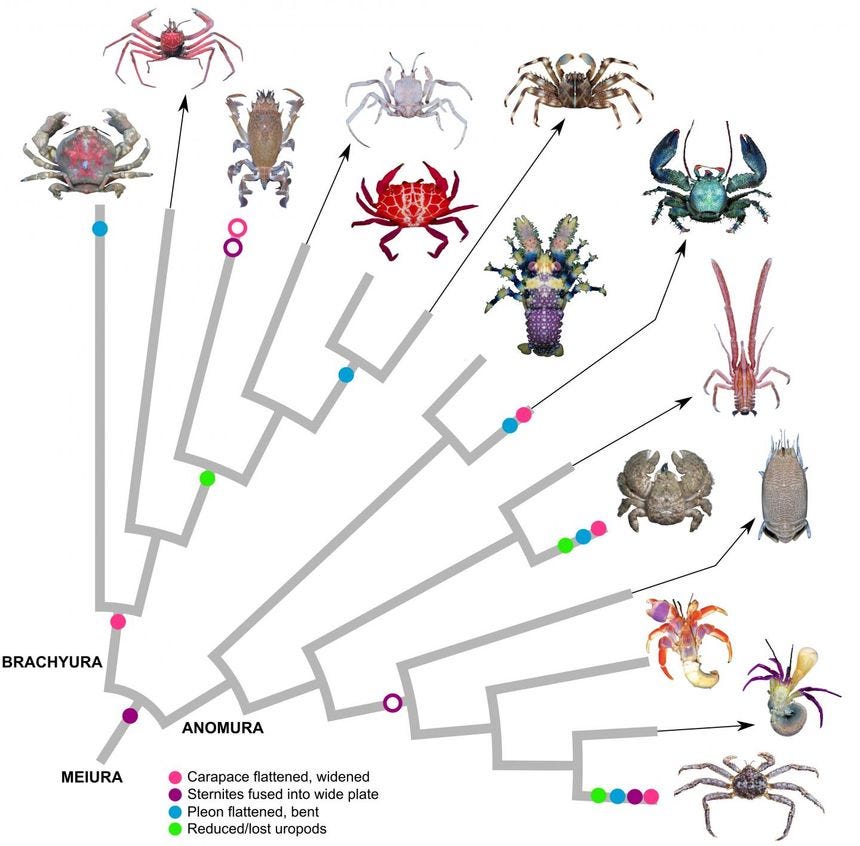The Scientific Bit
A phenomenon that has always fascinated me is convergent evolution. This is when specific desirable traits evolve across unrelated species of the same biome, bringing them closer in kind despite belonging to different species. For example, many types of crabs aren’t actually crabs at all—they’ve just evolved to appear that way because being crabby is highly advantageous. This specific phenomenon in convergent evolution is called carcinization.
Another aspect of evolution that’s quite notable is called “regressive evolution” or “devolution,” in which organisms lose traits that were quite helpful. One notable example of this is fish that, after many generations of living in dark caves, have lost their eyes. Biologists will tell you that evolution doesn’t moves backward, and I’m not arguing that, but I am a firm believer that having eyes is better than not having eyes.
Bio-organisms aren’t the only things that propagate and evolve. Richard Dawkins of Darwinist fame coined the term “meme” when describing how units of cultural transmission get imitated, replicated, and take on lives of their own. These could be trends, music, ideas, words, beliefs, behaviors, and other cultural phenomena. And of course, memes, much like genes, evolve and mutate as they spread.
So what happens when the memes of our culture convergently devolve?
The Contextual Bit
The 1960s were a wild time. Peace, drugs, and free love were all the rage. Although peace didn’t really work out, drugs and free love burrowed their way into the cultural zeitgeist, becoming the themes of countless films, songs, and collegiate gatherings. Why? Because peace, a higher ideal, proved less memetically successful than rage and division, but unbridled sex and drugs are incredibly easy to get behind as they feel good in the moment and take very little effort.
As the memes surrounding sex and drugs evolved and developed with our culture, the views became less principled and more hedonistic. People fought for things because they wanted them, not because of any societal betterment. Where once you had people like Tim Leary explaining the complex, often spiritual nature of psychedelics, or Barbara Gittings working to get homosexuality removed from the DSM, now you have people who have put their basest gratifications as the highest ideal.
It’s fighting for the sake of fighting, as meaning has been lost. Pavlov’s dogs are lashing out to defend the bell.
The Communications Bit
In the field of communications, there are two concepts that are largely intertwined: cultivation theory and the media-audience feedback loop.
Cultivation theory is the idea that prolonged exposure to media shapes the perceptions of viewers on a macro level. Through this exposure, ideas become mainstreamed, narratives are shaped, and attitudes are formed. A very basic example: if everyone on TV is saying something is good, society will eventually follow. Cultivation works best when it aligns with the real-life experiences of the viewer, which brings us nicely to the second concept.
The media-audience feedback loop explains how audiences and media influence each other. Audiences select media that satisfies their specific needs—a concept rooted in Uses and Gratifications Theory—and, in turn, media producers adapt content to better suit audience preferences. This creates a mutually transformative cycle, where media consumption shapes audiences, and audience preferences reshape the media landscape.
Now, these things aren’t inherently bad. That’s just the way it works in the information age—no way around it. The problem is the trajectory we’ve been on.
The Grievances Bit
Our society is convergently devolving into the id of it all. Our visual media is being pornified, news has become reality TV, mainstream music is increasingly vapid, our thought leaders are incredibly thoughtless, and the people shouting the loudest have no idea what they’re saying.
And that makes perfect sense.
Because we are a society that doesn’t know what it believes—nor does it know what it wants. We just know there’s a hole, so we try filling it with whatever we can—and our providers are catering to the lowest common denominator. We all have base, primal instincts, which are easy to cater to en masse for media makers. But our base primal instincts don’t actually have any drive beyond scratching itches.
Our primal desires don’t have the incentive to tend to the cause of the itches, either. That’s why the internet gives us blurbs of things to get angry about, get freaky with, or go “aww” to. We are treated to idea of the thing without having to engage in any actual thinking or contend with the nuances of our imperfect reality.
We pursue seemingly ideal imitations, prompting the media to give us more crap, conditioning us to crave more extreme versions of the same. We’ve become so obsessed with the exaggerated, perfectly edited imitations of life that real life is too removed from our perceptions of reality to even be desirable. Our hedonistic nihilism has led us to a world where we are on a cognitive diet of informational Pop-Tarts: immediately scratches an itch, doesn’t satiate a thing, makes us sick, and prolonged excess only makes our situation worse.
And now our society is poptarded.
The Solution Bit
We’ve done this to ourselves, friends. It’s up to us to get out of it. As members of the global village, it’s up to each and every one of us to consume quality information, think for ourselves, and only create content if it’s conducive to the benefit of our informational landscape. That’s not to say we shouldn’t have fun with each other online, but posting explicitly harmful, poptarded material should be something we’re wary of.
If we are spreading information, we should check it for factuality. If you don’t know what to do with yourself, perhaps fill your time with learning something new, enriching yourself rather than wasting your mental energy on empty data calories.
Maybe don’t post sexually explicit material everywhere. I think I speak for most writers on Substack when I say it’s annoying that some people are trying to turn the platform into OnlyFans for nerds. Stop it. Keep it where the age ratings are if you must share your privates in public.
One thing our society has forgotten is that actions have consequences, and we suffer for them. Guys, we are a first-marshmallow civilization, and it’s killing us.
The hole so many people are trying to fill right now is real life. We are living in a hell of our own making. The panoptic gaze of social media, the wrathful attitudes of a culture obsessed with outrage, and a lack of shared values or purpose have left people afraid and alone. I’m not even talking about a God-shaped hole. I’m just saying people weren’t designed for this.
We need meaningful connections, real experiences, diets of quality information, and purpose in our lives.
If we want to improve our society, cultivation is a place to start. If we want to cultivate a better, healthier, happier world, we need to treat ourselves well. We can’t settle for Pop-Tarts anymore. We all deserve better. And we can get that, we really can, but it’s incumbent on each of us to order it, because better only comes when ordered in bulk.
I’ll leave you with this:
Viktor Frankl once said,
“When a person can’t find a deep sense of meaning, they distract themselves with pleasure.”
If nothing else, let’s try finding a shared meaning in bettering our world.







